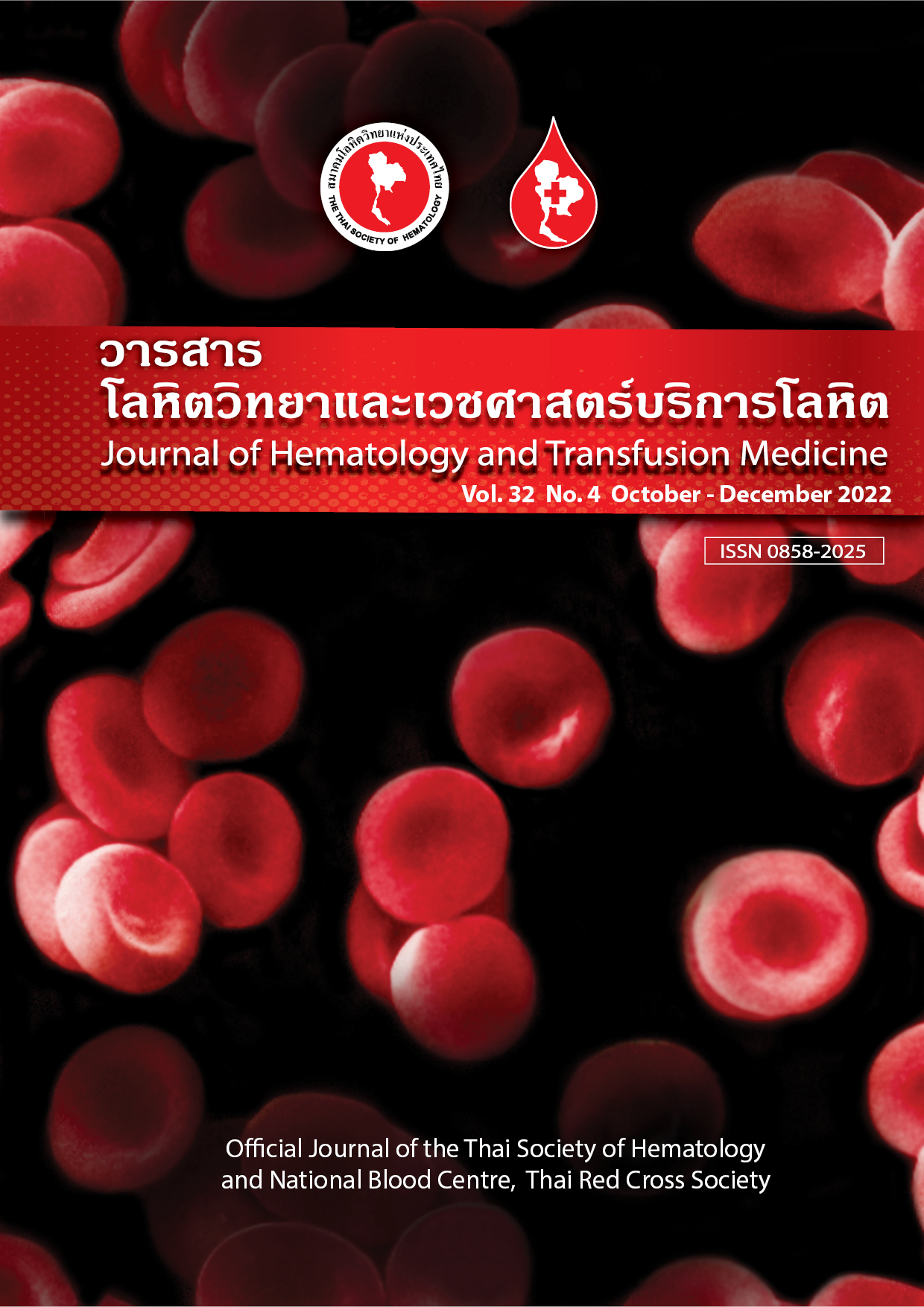The prevalence of unexpected antibodies in transfused cancer patients at National Cancer Institute
คำสำคัญ:
การตรวจกรองแอนติบอดี • แอนติบอดีไม่พึ่งประสงค์ • ผู้ป่วยมะเร็งบทคัดย่อ
บทคัดย่อ
บทนำ การกระตุ้นการสร้างแอนติบอดีต่อเม็ดเลือดแดงเป็นการตอบสนองของระบบภูมิคุ้มกันของร่างกายต่อแอนติเจนของเม็ดเลือดแดงที่แปลกปลอม โดยทั่วไปปรากฏขึ้นหลังจากการได้รับเลือดหลายครั้งหรือจากการตั้งครรภ์ การตรวจหาแอนติบอดีเป็นบทบาทสำคัญของงานเวชศาสตร์ธนาคารเลือดทำให้สามารถพบแอนติบอดีได้ วัตถุประสงค์ การศึกษานี้มีวัตถุประสงค์เพื่อทราบความชุกและความจำเพาะของแอนติบอดีต่อเม็ดเลือดแดงในผู้ป่วยมะเร็งที่ได้รับโลหิต วัสดุและวิธีการ เป็นการศึกษาย้อนหลังของงานธนาคารเลือด สถาบันมะเร็งแห่งชาติ กรุงเทพมหานคร ประเทศไทย ระหว่างเดือนมีนาคม พ.ศ. 2562 ถึงเดือนมีนาคม พ.ศ. 2565 การตรวจกรองและแยกชนิดแอนติบอดีทดสอบโดยใช้น้ำยาเม็ดเลือดแดงผลิตจากศูนย์บริการโลหิตแห่งชาติ สภากาชาดไทย ทำการตรวจผู้ป่วยมะเร็งจำนวน 6,060 ราย ด้วยเทคนิคหลอดทดลอง ผลการศึกษา พบอัตราการกระตุ้นให้สร้างแอนติบอดีต่อเม็ดเลือดแดงร้อยละ 2.3 (139/6,060) พบแอนติบอดีในผู้ป่วยเพศหญิง(ร้อยละ 64.7) มากกว่าผู้ป่วยเพศชาย (ร้อยละ 35.3) พบ anti-Mia เป็นแอนติบอดีที่พบได้มากที่สุดร้อยละ 66 (64/97) ของผู้ป่วยที่พบแอนติบอดีที่จำเพาะชนิดเดียว ในขณะที่พบ anti-E เป็นแอนติบอดีที่พบได้มากที่สุดคิดเป็นร้อยละ 50 (21/42) ของผู้ป่วยที่พบแอนติบอดีที่จำเพาะมากกว่าหนึ่งชนิด สรุป ความชุกของแอนติบอดีต่อเม็ดเลือดแดงในการศึกษานี้มีอัตราที่ต่ำกว่าการศึกษาก่อนหน้านี้ในผู้ป่วยมะเร็งชาวไทย การให้โลหิตหลายๆ ครั้งสามารถกระตุ้นให้มีแอนติบอดีต่อเม็ดเลือดแดงได้ ซึ่งทำให้เกิดความซับซ้อนในการให้โลหิตในครั้งต่อไป ดังนั้นจึงเสนอให้มีการตรวจหาแอนติเจน Mia และ E ในโลหิตผู้ป่วยไว้ล่วงหน้า สำหรับการวางแผนให้โลหิตที่มีแอนติเจน Mia และ E เหมือนกับโลหิตผู้ป่วยมะเร็งซึ่งจะต้องได้รับโลหิตเป็นระยะเวลายาวนาน เป็นการป้องกันมิให้ผู้ป่วยสร้างแอนติบอดีซึ่งอาจเกิดความยุ่งยากในการให้โลหิตครั้งต่อไป
Abstract:
Introduction: Red Blood cell (RBC) alloimmunization is an immune response against foreign RBC antigen; this generally occurs after sensitization as a result of multiple blood transfusions and pregnancies. Antibody detection plays a critical role in transfusion medicine as it can detect alloantibodies. Objective: This study was done to determine the frequency and specificity of red cell alloantibodies in the cancer patients. Materials and Methods: This retrospective study was done in blood bank unit, The National Cancer Institute, Bangkok, Thailand, during March 2019 to March 2022. Antibody screening test and antibody identification test were performed by using RBC reagents (2-cell screening cells and 11-cell panels, The National Blood Centre, Thai Red Cross Society) using the conventional tube test, in 6,060 oncology patients. Results: In this study, the rate of alloimmunization was 2.3% (139/6,060). Our study showed that more female patients (64.7%) than male patients (35.3%) had acquired RBC alloantibodies. Anti-Mia antibody was the most frequent antibody detected in 64 of 97, that is, 66% patients who have single RBC alloantibody, whereas anti-E antibody was the most frequent antibody detected in 21 of 42, that is, 50% patients who have multiple RBC alloantibodies. Conclusion: The prevalence of alloimmunization in our study is fewer than the previous report on the Thai cancer patients. Repeated blood transfusion, which can lead to alloimmunization, often complicate future transfusion. Therefore we recommend extending Mia and E phenotype matching for patients who are presumed to depend on blood transfusion in the long term.
Downloads
เอกสารอ้างอิง
International Society of Blood Transfusion. 201_Table of blood group systems_v10.1_30-SEP-2022 with LRG. Availble from: https://www.isbtweb.org/resource/tableofbloodgroupsystems.html.
Bejrachandra S. Clinically significant of blood group antibody. Thai J Hematol Transf Med. 2005;4:211-5.
Saipin J. Blood group antigens and antibodies. Thai J Hematol Transf Med. 2008;1:3-5.
Cooling L. ABO, H and Lewis blood groups and structurally related antigens. In: Roback JD, Combs MR, Grossman BJ, Hillyer CD, editors. Technical manual. 16th ed. Bethesda, MD: AABB; 2008. p. 361-75.
Chidtrakoon S, Jeumjanya N, Sasikarn W, Intharanut K, Nathalang O. Prevalence and specificity of red cell alloantibodies in repeated antibody screening among Thai blood donors. J Med Tech Assoc Thai. 2018;46:6241-52.
Plungklang S, Urwijitaroon Y. Unexpected antibodies among blood donors detected by standard tube test and a column gel agglutination test: A study for safe blood transfusion. J Hematol Transfus Med. 2014;24:17-23.
Saipin J. Techniques of red cell antibody detection. J Hematol Transf Med. 2003;13:225-31
Kheauchanta S, Muksikapan P, Klaitong C. Unexpected antibodies in cancer patients at Maha Vajiralongkorn Thanyaburi Hospital. J DMS. 2021;46:65-72.
Sinkitjasub A, Chanta P, Thienthaworn J. Prevalence of unexpected antibodies in transfused patients and pregnant women at Taksin Hospital. Thai J Hematol Transf Med. 2016;26:347-55.
Rattakul A, Intharanut K, Nathalang O. The prevalence of red cell antibodies among patients and pregnant women in Pakchongnana Hospital. J Hematol Transfus Med. 2019;29:317-24.
Pongernnak P, Sasjeenpong S, Chuesakul K, Pangwangthong K. The prevalence of red blood cell alloantibodies in lower northern Thailand. J Med Assoc Thai. 2016;99:1337-43.
Srijinda S, Bosuwan S, Nuanin, Suwanasophon C. Anti-Mia and anti-E: the most common clinically significant red cell alloantibodies in patients at Phramongkutklao Hospital. Royal Thai Army Med J. 2017;70:65-9.
Romphruk AV, Wanhagij C, Akahat J, Tantanapornkul P, Anuphan T, Pattayaso P, et al. Anti-P1: the most common unexpected antibodies in Northeastern-Thais. J Med Assoc Thai. 1999;82:803-7.
Butryojantho C, Junta N, Pimphumee R, Srichai S, Darunikorn P, Puapairoj C, et al. Antibody screening and the prevalence of unexpected antibodies in the patients of Srinagarind Hospital. Thai J Hematol Transf Med. 2017;27:27-33.
ดาวน์โหลด
เผยแพร่แล้ว
ฉบับ
ประเภทบทความ
สัญญาอนุญาต
ลิขสิทธิ์ (c) 2022 วารสารโลหิตวิทยาและเวชศาสตร์บริการโลหิต

อนุญาตภายใต้เงื่อนไข Creative Commons Attribution-NonCommercial-NoDerivatives 4.0 International License.



